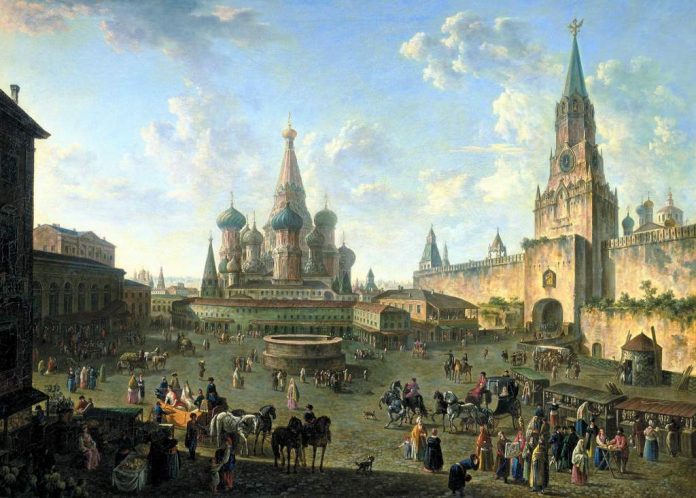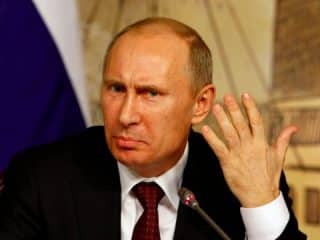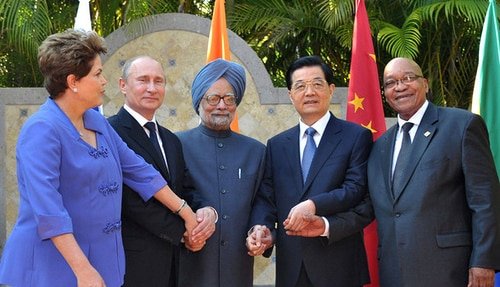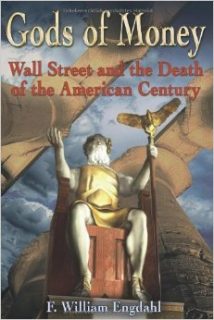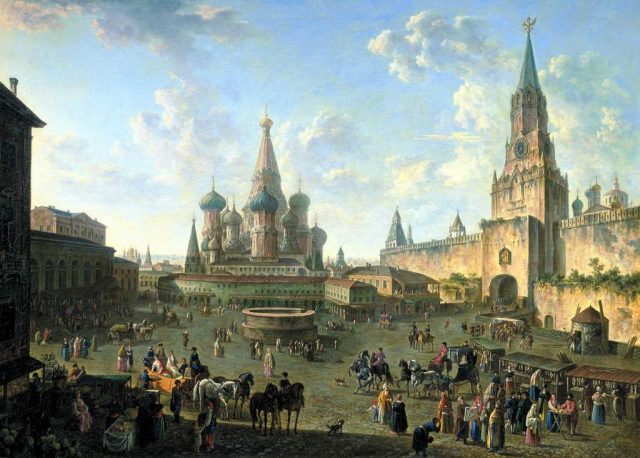
by F. William Engdahl, … with New Eastern Outlook, Moscow
The seven golden domes of St. Petersburg[ Editor’s note: This is a major geopolitical piece for Engdahl, and one for which his long career in the region has well prepared him. He begins with the major shifts going on in the Syrian War, and then digs further down into the bedrock of whence did all this come, and of course that is the “usual suspects”.
In modern times, that refers to not just the Jewish lobby, as that is primarily a political construct, but the Jewish mafia, which Preston James refers to as the “Khazarian Mafia”, and this term is an historical construct.
Engdahl puts the spotlight on the City of London Mafia and its history, that since the 19th century I would simply describe as an international organized crime and terrorist organization.
If you think that sounds harsh, then just count the bodies and the path of destruction in its wake. William has done the dot-connecting for us, although sprinkling more dates within it would have helped the chronology. We love to share these with you, because we know how much work it takes to put an article like this together.
The NEO people were early fans of VT. They liked our irreverence and our diversified audience. We were an odd couple match. The initial contact was a probe to start writing for them, which I of course accepted; but offered something in return, that if they really did have a pool of top Russian scholars on Eurasia, I wanted to feature them as an anchor on VT for more geopolitical magazine layouts. These articles attract a higher caliber of readers, who are looking for more in-depth material, versus the endless op-ed blogs that are awash over the Internet.
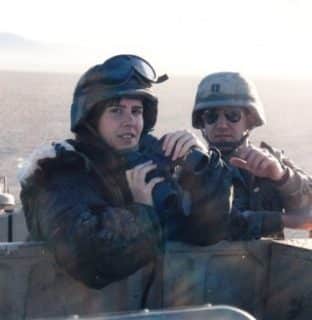
It worked, and Gordon soon joined the effort, and then later Bill Engdahl, and Gwenyth Todd for a while. Chance meetings that turn out so well are rare.
We had a great run with PressTV until Emadi took over the website and strangled the Viewpoints section that we had put two years of hard work into building into a major readership draw.
We continue looking for a new Iranian commentary home to recreate that success, as it was wonderful being able to get breaking news articles up, sometimes in 12 hours on the other side of the world. Sources love to see their material distributed quickly, which stimulates getting even more sources.
We will strive to continue on, but the seven days a week pace cannot be maintained forever. At some point, we will have to ease off and redo the formula.
And then, there are issues like not having read a book in years… there just isn’t the time. I used to read one book per week during my Heritage TV work in Atlanta. I look over at the bookshelves, and it seems like 20 years ago, when it was only 15. One does not want the Internet monster to get everything… Jim W. Dean ]
__________
– First published … October 18, 2015 –
The Russian decision to proceed with military support to the Damascus government has shifted the global geopolitical map significantly. For the moment Washington is choosing to react with words, no doubt planning carefully its next move.
The Russian intervention has exposed the fraud of the US position in the Middle East and shown the world that Washington lies, that she supports the very terrorists who allegedly were behind the September 11, 2001 attacks in New York and at the Pentagon.
The decisive question now is what strategic plan does Moscow have to foster world peace after the defeat of ISIS?
From the standpoint of tactics, Russia has made a brilliant, unexpected move against the war agenda of certain very bad circles in the USA by her invitation to Washington to form a common coalition to combat terrorists in Syria, to wage a real “war on terror,” an offer immediately rejected by President Barack Obama.
By accepting the invitation of the legitimate government of Bashar al-Assad to help combat the grave danger of ISIS, Al Qaeda (al-Nusra Front), and numerous other outlaw terrorist gangs, most made up of foreign mercenary psychopaths from at least 80 foreign countries, Russia is scrupulously abiding by the UN Charter. The US, which has been bombing a sovereign nation for more than one year without permission, is not abiding by international law.
As Russian President Vladimir Putin has declared repeatedly over a period of years, Washington and those who control Washington policy are pursuing some form of what they like to call America’s Manifest Destiny, ever since the Soviet Union dissolved and with it the Warsaw Pact military alliance in 1990-1991. It is neither manifest nor destiny, rather the mad plan of some power-addicted circles.
A triumphalist President George Herbert Walker Bush admitted that “destiny” or, in fact, an undeclared agenda of those power-addicted circles, in an address to a Joint Session of Congress on September 11, 1990. Bush was one of the prime engineers of the transformation of the United States into a globalist war machine of empire. In his September 11 speech, Bush proclaimed that America as Sole Superpower would create what freemasons and others refer to as a “New World Order,” or as the American dollar bill declares in the Latin, Novus ordo seclorum.
That new order, as is clear today, is one of war, killing, chaos, hate and vengeance, negativity everywhere in the world where there is positivity. It’s very much the history of the forty so years since Bush was Director of the CIA, and put much of those developments into motion starting with the 1991 US invasion of Iraq.
Wolfowitz Doctrine
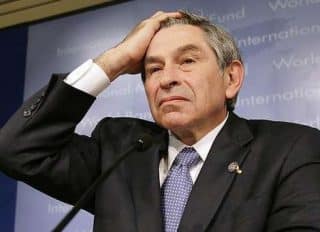
In February 1992, the Pentagon’s Defense Planning Guidance for 1994–99, a strategic policy for the post-Cold War era – a world with one Sole Superpower – was drafted by the office of Under Secretary of Defense for Policy Paul Wolfowitz.
Known today as the Wolfowitz Doctrine, it was prematurely leaked by a Pentagon official who believed such a radical departure from US defense posture – particularly when the prime “enemy,” the Soviet Union, was no more the enemy – should be subject of a full public debate.
The initial draft policy, which is actual policy today, was hastily edited and softened after appearing in original form in the New York Times. The original policy however remained until today.
The original Wolfowitz doctrine stated that, “America’s political and military mission in the post-cold-war era will be to insure that no rival superpower is allowed to emerge in Western Europe, Asia or the territory of the former Soviet Union.”
It called for action outside the UN rules if necessary and for the US military to wage pre-emptive wars:
“We will retain the preeminent responsibility for addressing selectively those wrongs which threaten not only our interests, but those of our allies…” At that time Dick Cheney was President Bush senior’s Secretary of Defense.
The Wolfowitz Doctrine proclaimed that the American mission will be,
“Convincing potential competitors that they need not aspire to a greater role or pursue a more aggressive posture to protect their legitimate interests.” The late US Senator Ted Kennedy denounced the doctrine in 1992, declaring it, “a call for 21st century American imperialism that no other nation can or should accept.”
That original Wolfowitz Doctrine became official, declared policy under George W. Bush’s presidency after September 11, 2001 when Cheney, Wolfowitz, Scooter Libby, Richard Perle, Andrew Marshall and other hard-core so-called neo-conservatives controlled US military and foreign policy. It was made public in the media as the Bush Doctrine or formally, the National Security Strategy of the United States, in 2002.
The policy justified “pre-emptive” US military strikes such as against the Taliban in Afghanistan and Saddam Hussein in Iraq, as well as US promotion of regime change in nations around the world not willing to tow the Washington line under the name “exporting democracy.”
_________
After ISIS, What?
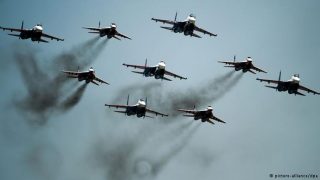
By launching an active military campaign in Syria against ISIS and other terrorists together with the legitimate Syrian government and armed forces, Russia has accepted what I consider to be an awesome responsibility. It in effect has shredded the unilateral tyranny embodied in a world under Washington’s Wolfowitz Doctrine.
It is clear that over recent days, far from being the nation defeated and bitterly humiliated by the West after 1990, Russia and its President, Vladimir Putin, have shown Russia is a power to be taken very seriously. This is necessary if the world is to organize a peaceful alternative to the wars that NATO and the Pentagon hawks are ever concocting. However, showing power, while necessary to establish authority, is by no means sufficient.
The strategic responsibility which Russia has undertaken by its actions in Syria is to be the transforming catalyst to form a larger coalition for genuine peace among nations and peoples, of respect for borders, for sovereignty – both individual and for states, if Russia and the world are to be better off for it. Otherwise, the military actions play into the spreading of war and destruction to all mankind.
The Russian military intervention into Syria, which began at the end of September, appears likely able to deal a devastating blow or defeat to the armies of ISIS, Al Nusra/Al Qaeda in Iraq and Syria and other Islamic terror groups that have been euphemistically defined by Washington as “moderate opposition” to Bashar al Assad. De Facto this intervention spells the end of the Wolfowitz Doctrine. Russia has called Washington’s bluff in Syria with its military actions.
The Russian Defense Ministry itself has estimated a 3-4 month military campaign to defeat the Syrian terrorists together with the official Syrian Armed Forces, Iran and others. The question at that point, with a semblance of stability in Syria and also Iraq, will be not only how to secure the stability to enable reconstruction of Syria where more than 9 million are displaced.
The ultimate challenge will be what economic order or matrix will emerge internationally from the ashes of war? That will determine the possibility or not of genuine peace and isolation of Washington’s war machine.
Here, fortunately, most essential components of such an alternative, sovereign economic order already exist, albeit in flawed form. I speak of the China-based Asia Infrastructure Investment Bank (AIIB) in Beijing with now 57 prospective members, and the BRICS (Brazil-Russia-India-China, South Africa) New Development Bank (NDB), which is already operating, based in Shanghai, China. The door to apply for membership in the AIIB would be open to a stable regime in Syria as well as Iraq. Iran is a founding AIIB member as is Russia.
That and perhaps infrastructure credits or loans from the BRICS’ NDB could go a long way to stabilize and spread world peace beginning in the hot warzones of the US Arab Spring. That is not sufficient though.
The flaw or danger is that the two new institutions create loans based on adherence to the Dollar System, and operate by the rules of the US-created World Bank and International Monetary Fund, apparently to gain international acceptance.
The postwar Order created by Washington and Wall Street between 1944 at Bretton Woods for the monetary order of a Dollar System and on August 9, 1945 in Hiroshima and Nagasaki for the military order of the so-called American Century, was the result of a top secret project financed by the Rockefeller brothers and their tax-exempt foundation, known as The War & Peace Studies. The studies were carried out under the umbrella of the New York Council on Foreign Relations, by then a Rockefeller-dominated policy think-tank.
Since that time, the ability of Washington and the American military industrial complex to wage wars has been intimately supported by Wall Street banks with their control of global finance, by their control of the dollar as world leading reserve currency. I refer readers for more detail to the account in my book, Gods of Money: Wall Street and the Death of the American Century.
Here we come to recent serious problems in both China and the Russian Federation. China, in her drive to make her Renminbi currency a world reserve currency is in danger of ultimately being vulnerable as never before to US Treasury financial and currency wars. Today the Renminbi is only partially and cautiously convertible into foreign currencies.
At the same time, the regime under Xi Jinping recently demonstrated how vulnerable is their mastery of the sly techniques of Wall Street, when their spectacular stock market bubble in Shanghai and Shenzhen markets with small scale, largely inexperienced, naive investors, some 90 million Chinese, blew up in their faces. That combined stock market crash erased an estimated $4 to $5 trillion in speculative paper gains in a matter of weeks beginning last June.
That market disaster has forced a top-level re-thinking of what western models work for China, an overdue healthy corrective. The other urgently needed corrective at this point is a re-consideration of their aim to make the Renminbi a “global reserve currency” alongside the US dollar, Japanese Yen, British Pound and Euro–the “Four Horsemen” of the IMF’s SDR Apocalypse.
Perhaps ten years ago it may have seemed a worthy goal for China to one day be awarded SDR status as a major currency. Today, those Four Horsemen currencies are choking on national debt, economic depression, deflation and unemployment, hardly goals for China to aspire to.
The alternative, as I suggested in an earlier posting, would be Chinese national issuance of “Peoples’ Bonds,” backed by the full faith and credit of the Peoples’ Republic of China. That would dramatically lessen risk for China of a repeat of the US-instigated 1997 Asia Tiger financial crises.
A Sovereign Ruble
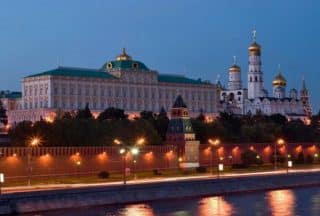
For Russia, the issue standing like the 800-pound gorilla in the middle of the church, is the re-sovereignization of the Russian Central Bank as a state institution, so that the Russian State is able to issue sovereign money, without looking over its shoulder to what Wall Street and US hedge funds and their corrupt rating agencies think.
In Iceland today the government, after imposing strict capital controls, taking control of the assets of the three large privatized banks causing the real estate speculation fraud crisis, prosecuting and jailing key figures, including a former Prime Minister and bank directors in that country’s 2004-2008 banking fraud, today is debating adopting what some call a “sovereign credit system,” or sovereign money.
All the military victories over terrorism in Syria and elsewhere will be for naught if Russia, China and other peace-wishing nations do not regain sovereignty of the vital component of their economic life—the right to issue national currency and control its volume and cost.
Private central bank money is not sovereign. It is rather private, as that of the Bank of England or the Federal Reserve is controlled by the major banks, not Parliament or Congress. Its supply of credit to the private banks is privately determined according to banker criteria of inflation and currency values, not according to a nation’s credit needs for its real economy.
In turn those private banks, according to the well-established practice of “fractional reserve banking,” create money out of thin air, something on the order of eleven times its official reserves in creating deposit liabilities.
Fractional reserve banking depends entirely on depositor confidence, in effect a huge confidence game. The US Federal Reserve today was forced to step in after the collapse of the major banks in 2007-8 and print trillions of dollars via so-called QE or Quantitative Easing, giving the banks huge volumes of cash to invest in a new stock market bubble and other ventures worldwide, while the Fed took banks’ dodgy assets.
All cycles of depression and economic boom since the 17th Century can be traced back to this fractional reserve banking model with its compounding of interest.
_________
Russia before Bolsheviks
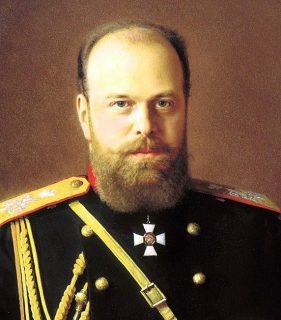
Contrary to the mythology that passes for history at western universities such as Cambridge, Oxford, Princeton or Harvard, Russia in the years leading to outbreak of World War I was on the path to become a towering prosperous economic nation — something especially not welcome in London.
Czar Alexander II during the American Civil War issued a decree to liberate the serfs in 1861. Unlike Lincoln’s emancipation of slaves, Russian serfs were liberated with land. The 22 million liberated serfs were free to go to the cities where they provided the labor force for emerging industry. In 1881, a terrorist band of some 40 members, assassinated Alexander II. Russia was becoming too powerful for the British.
The assassin came from a terrorist clique, People’s Will (Narodnaya Volya), secretly financed by London international bankers as were virtually all such “revolutionary” organizations then in Russia, much as the USA government NGO’s today finance the Russian Opposition Coordination Council, Alexey Navaly’s Progress Party and other “opposition” groups.
Despite the death of Alexander II, modernization of Russia continued. In 1883 the assassinated Czar’s son, Alexander III, followed serf liberation with creation of the state Peasant Land Bank allowing peasants to buy their land with virtually interest free loans.
Railways were built, including the Trans-Siberian Railway, the ambitious project of Russia’s great economic innovator, Count Sergei Witte. Witte, who had translated the German national economist Friederich List into Russian, was well aware that the phenomenal industrialization of Germany after 1871 owed much to the ideas of List and his followers.
The Czar named Witte as Director of Railway Affairs within the Finance Ministry from 1889 to 1891. There he initiated building the Trans-Siberian Railway to unify the vast area of Russia. Witte also managed to win the principle to assign employees based on their performance, rather than political or family connections.
In 1889, Witte published a paper, “National Savings and Friedrich List,” outlining the economic theories of List, who justified the need for a strong domestic industry, protected from foreign competition by customs barriers, opposite today’s WTO or TPP or TIPP free trade regimes. This resulted in a new customs law for Russia in 1891, which spurred a dramatic increase in industrialization.
In 1892 Witte as Minister of Finance accelerated funds to railway construction, made a treaty agreement for passage of the Trans-Siberian rail line via China to Vladivostok, and concluded a ten year commercial treaty with Germany. In 1896 he put the ruble on the gold standard, and passed a law limiting factory work hours and other labor laws more advanced than those of the United States then. Russia was prospering and at peace with all her neighbors, especially Germany and China.
British machinations to foster the 1905 Russo-Japanese War and the ensuing Revolution of 1905 in Russia, and ultimately to manipulate the Czar into a secret alliance with France against her natural ally, Germany, resulted in the destruction of the enormous positive developments of pre-Revolutionary Russia.
Wall Street and the City of London financed Leon Trotsky, Lenin, and the Bolshevik Revolution essentially as they did Boris Yeltsin after 1990, to open up Russia for looting and balkanization by favored western companies.
Russia’s awesome responsibility
Today Russia, in association with the Eurasian Economic Union partner countries, with the Shanghai Cooperation Organization partner countries, with the BRICS partners and the emerging group of nations in the Middle East, is in a unique position to not only deal a death blow to Washington-created terrorists in Syria, but also to transform the foundations of world economic stability by understanding the true possibilities she has to end the tyranny of debt slavery by private western banks and their central banks of the Dollar System.
The Russian Orthodox Patriarchate recently circulated its proposals for creation of interest-free banks based on the Islamic banking model. There are many useful ideas being debated in the wake of the brutal Washington and EU economic sanctions.
But so long as Russia’s Central Bank adheres to western central bank rules and makes inflation control and ruble stability the purpose of monetary policy, Russia ultimately may win the battle for Syria and lose Russia and all positive impulse she represents for the world.
What we face in our world today goes far beyond the battle over Syria. The world is being lured into wars everywhere, from Ukraine to the South China Sea, from Libya to Europe itself in the form of floods of war refugees spreading war energy.
In a real sense the United States itself is in a spreading war of violence, race hate and killings. Latin America is in a state of war in Venezuela, Brazil and elsewhere, wars, even if economic and political wars at present.
What is being confronted today in Syria by Putin’s Russia is the vulnerable end, the Achilles Heel, of a vast plot to bring all of the countries of the European Union and Russia and China ultimately into a state of war, beginning with floods of Islamic refugees disrupting the normal order of entire nations such as Germany, and also threatening Russia itself with Chechyn and other Islamic terrorists returning from ISIS, as well as threatening China via her Uyghur Muslim population.
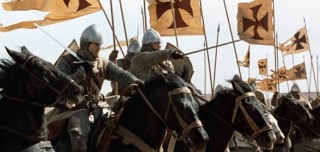
In an eerie way, it is the reverse of the Great Crusades that began under mandate from Pope Urban II at the Council of Clermont in 1095, which turned much of Europe, Byzantium and what is now Ukraine and Russia, into bloody killing fields that laid the basis for the Medieval Dark Ages.
This time Islamic fanatic Jihadist terrorists are sweeping into Western Europe, into Russia, into China to destroy the institutions ultimately of stability built over the centuries since the Great Crusades.
In 1095, the Roman Pontiff wanted a war against those who had caused the Great Schism with Rome in 1054. The aim was to capture Constantinople, the center of Orthodox Christianity, where at the time Orthodox Christian monasteries expanded as far as Syria. What resulted over the course of two or more centuries of brutal Crusades, ultimately spread to European Christians, to a Crusade against of so-called Christian Catholic lands against eastern Orthodox Christians, and Christian Catholics warring against Islam.
Today’s Crusade was initiated perhaps as far back as the decision by George H.W. Bush and his sponsors in 1991 to launch a brutal war against Saddam Hussein’s Iraq—Operation Desert Storm. Since that point the US military has been implicated in the Yugoslav dirty war from 1991, which among other aims was aimed to show the EU it was impotent without Washington’s military and to claim NATO must stay. Then came the 2001 US war on Afghanistan followed by the war on Iraq, then the numerous wars of “democracy” called Arab Spring after 2010 until Syria today and Ukraine.
Stepping outside the individual wars and viewing events as if from above, it becomes clear that the devilish plan behind these cumulative disturbing wars over especially the past two decades is to destroy the Euro as potential rival to the US dollar as viable reserve currency of the world economy, and to destroy any idea of an EU that is sovereign and independent in foreign and defense policy as the original Maastricht Treaty mandated in 1992. The only way Europe could manage such a challenge to American hegemony would be firmly to integrate their economies, especially Germany’s, with Russia and China and all Eurasia.
For the Sole Superpower, it became essential to destroy any possible independent EU that could exist apart from being a vassal to a US hegemony. It became essential to destroy the emergence of the European Economic Union and the Euro as a threat to the prime reserve currency role of the US dollar, hence the Euro crisis around Greece after 2010.
It became necessary to destroy the increasingly strong economic and political ties that were growing rapidly prior to November 2013 between the Federal Republic of Germany and the Russian Federation. Hence the February 2014 US Coup d’État in Ukraine and forcing the EU, against her own economic interests, to impose economic sanctions against Russia via US blackmail on Germany and other EU states after 2014.
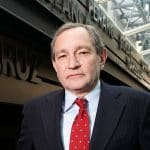
As Stratfor head, George Friedman, one of the few studied geopolitical analysts in the US establishment, remarked in a speech in March 2015 to the Chicago Council on Foreign Relations, a prime focus of US foreign policy for the past 100 years has been about preventing an effective alliance between Germany, with its great economic excellence, and Russia with its vast resources and geographical extent.
A deep study of history then can tell us volumes about what forces Russia, Germany and the world face today.
It is an awesome responsibility Vladimir Putin and the Russian state accepted when they accepted President Assad’s request to aid his war on terror. Clarity on the strategic goal for not only Russia, but also for the vast majority of the world with whom Vladimir Putin’s Russia has positive relations, is the next step.
F. William Engdahl is strategic risk consultant and lecturer, he holds a degree in politics from Princeton University and is a best-selling author on oil and geopolitics, exclusively for the online magazine “New Eastern Outlook”.
____________
Jim Davis is the son of USMC MGySgt. Lesley Davis (Ret.) who passed away on April 24, 2006, from ALS caused by Agent Orange. His dad’s mission before he passed on was to ensure all veterans, spouses, children, and widows all received the benefits, medical care and attention, and proper facilities from the VA.
Because of the promise made to his dad to carry on the mission, in May 2006 Davis began as a one-man show sending out 535 letters every single week to all members of Congress requesting and politely demanding the fulfill their promises made over the past decades to care for life those who wore the uniform and their families.
Veterans-For-Change was born in August 2006 with a very small membership of 25 people composed of veterans, spouses, widows, family members, and friends and to date continues to grow.
ATTENTION READERS
We See The World From All Sides and Want YOU To Be Fully InformedIn fact, intentional disinformation is a disgraceful scourge in media today. So to assuage any possible errant incorrect information posted herein, we strongly encourage you to seek corroboration from other non-VT sources before forming an educated opinion.
About VT - Policies & Disclosures - Comment Policy

